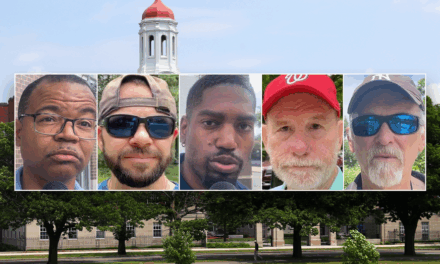The picturesque Martha’s Vineyard, a popular summertime destination known for its serene landscapes and affluent vacationers, has recently been engulfed in controversy following a series of arrests involving undocumented immigrants within its borders. The island, long seen as a liberal enclave, has been shaken by this unexpected turn of events, igniting tensions among residents and sparking a heated debate about immigration policies and community values.
For many years, Martha’s Vineyard has stood as a symbol of progressive ideals, often championing individual rights, inclusivity, and social justice. Despite its reputation, which has attracted celebrities, politicians, and vacationers, the community is now grappling with the complexities and ramifications of immigration reform, especially concerning those who find themselves living in the shadows.
It all began when local law enforcement initiated a series of raids aimed at identifying and apprehending individuals suspected of being in the country illegally. This law enforcement action was part of a broader strategy to address complaints regarding crime and safety in the area, where a noticeable increase in tensions has been reported. Residents were left stunned as they witnessed their peaceful community become the backdrop for such controversial operations.
Local news outlets reported that the arrests, made up of men and women from various Central American countries, were largely met with dismay from the community. Many residents took to social media to express their frustration, arguing that these actions contradict Martha’s Vineyard’s longstanding identity as a welcoming and inclusive place.
Among those affected by the arrests was a 28-year-old man originally from Venezuela, who had sought refuge on the island. Describing himself as a hardworking individual striving to provide for his family, he shared his disbelief upon being apprehended during a routine stop. “I never thought something like this could happen here,” he lamented. “I came to this place looking for safety and opportunity.” His story has resonated deeply with supporters of immigrant rights on the island, fueling passionate discussions.
Community members are also voicing concerns about the potential impact of these arrests on the local economy. Small business owners, reliant on a diverse workforce, worry about the future of their businesses if their employees are targeted or deported. “It’s a difficult situation,” said one local bakery owner. “We depend on a range of talents and backgrounds to keep our doors open. Losing good workers only hurts us in the long run.” This sentiment is shared by many across Martha’s Vineyard, where the hospitality industry thrives on the contributions of various communities.
The backlash following the arrests has polarized opinions within this close-knit isle. Supporters of stricter immigration controls argue that laws must be enforced to protect the community’s integrity. They emphasize the necessity of monitoring undocumented populations, claiming it ties into broader concerns about safety. However, opposition voices assert that compassion must prevail. “Everyone deserves a chance to build a life,” said one resident. “If we’re going to remain true to our principles, we can’t forget that.” Discussions of fairness, justice, and humanity underscore the ongoing debates.
Adding another layer to this complex situation is the stigma surrounding the issue of criminality and immigration. Many residents argue that the portrayal of undocumented immigrants as criminals only exacerbates fears and hostilities. “Most of the people I’ve met are just trying to survive. They work hard and contribute positively to our community,” noted a local activist. “We need to challenge the narrative that equates immigrant status with criminality.” The need for a nuanced understanding of the immigrant experience has gained traction among those rallying against the arrests.
The socio-political landscape in which these events are occurring is also noteworthy. Martha’s Vineyard’s history as a liberal bastion often brings with it a sense of moral superiority. Residents now face the uncomfortable reality that their beliefs are being tested. The community’s leaders are under pressure to speak out on the matter, navigate the competing interests, and potentially redefine what it means to be a place that welcomes all.
Local officials have been working to address the fallout. Town meetings have become essential platforms for community discussions, where residents gather to voice their fears, frustrations, and hopes. These gatherings have turned into robust forums for exchanging ideas and seeking a pathway forward that aligns with Martha’s Vineyard’s values.
Among the proposed solutions is the potential formulation of a sanctuary policy that would protect local undocumented immigrants from deportation. Advocates propose creating safer spaces while acknowledging the need for law enforcement cooperation. However, implementing such policies would require careful deliberation, as not all residents agree on this course of action.
As discussions unfold, it is also vital to consider the messages conveyed by Martha’s Vineyard’s more prominent residents. Public figures who visit or own property on the island, including celebrities and political figures, play a significant role in shaping the community’s narrative. Some have come out in strong support of immigrant rights, while others maintain a more complex stance on the issue. Their voices contribute to the overall discourse, influencing local perspectives in nuanced and various ways.
This recent chapter in Martha’s Vineyard’s history raises important questions about identity, values, and the very nature of community. As residents grapple with the conflicting emotions and complexities of these arrests, many are reflecting on what it means to be part of an inclusive society while still addressing concerns about safety and legality. In practice, this debate will shape the island’s identity for years to come.
Furthermore, the situation highlights the importance of broader national conversations about immigration reform. As many Americans engage with the realities of a changing demographic landscape, Martha’s Vineyard serves as a microcosm of larger societal struggles over immigration policy—an issue that continues to polarize the nation.
As more communities come to terms with the implications of immigration within their own borders, lessons learned from Martha’s Vineyard may resonate beyond the island. The local challenges reflect a deeper need for reconciliation, empathy, and balanced discussions. Ultimately, navigating the complexities of immigration and community identity is no easy feat. Residents find themselves at a crossroads, forced to confront and redefine the ideals they have long held dear.
As Martha’s Vineyard moves forward, the hope remains that through dialogue and understanding, it can emerge as a model for how communities can coexist amid diversity and differing opinions. The ongoing story of Martha’s Vineyard and its undocumented population will undoubtedly evolve, and the community’s response will be crucial in shaping its future.
































